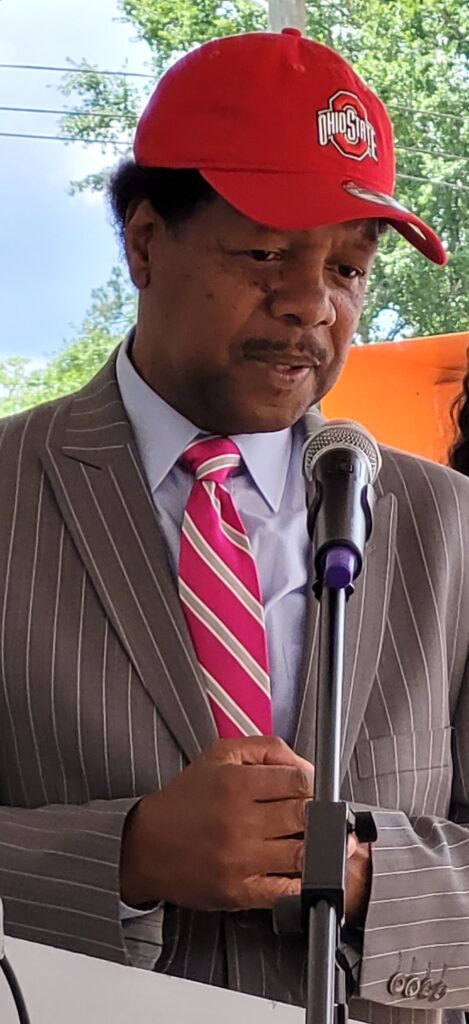
Bills of consequence
Legislators propose measures that
could affect city, county governments

Photo by St. Clair Murraine
By St. Clair Murraine
Outlook Staff Writer
While communities across the state are fighting back against legislation that affects education and voting rights, there are several bills that could impact how home rule is applied in local government.
There are at least three bills that are concerning to city and country governments in Tallahassee. However, no matter the legislation, both governments have individuals at the Capitol bird-dogging every bill whether it has the potential to become law or not.
There is SB 576 that could determine who gets on law enforcement review boards. HB 57 (SB 438) could do away with unlimited terms for county commissioners and then there is HB 1195 that could determine how much property tax is placed on homeowners.
Lobbyists who represent the city and county governments said they would prefer if legislators would yield to the state’s home rule law.
“We think that the government closest to the people governs best,” said Casey Cook, Chief of Legislative Affairs for the Florid League of Cities. “Cities need more tools to solve problems, not less to solve problems that are unique to their communities.”
None of the three bills could impact local government more than HB 1195, which is sponsored by Rep. Sam Garrison, a Fleming Island Republican. That measure would increase to $75,000 the amount that could be exempted from taxes.
The proposed bill would require a specific vote before a municipality could put a new millage rate into effect. Typically, most local governments could only approve tax increase by simple majority.
In order for the Garrison-sponsored bill to be approved, it would require a two-third vote in the Legislature.

Photo by St. Clair Murraine
Through the League of Cities lobbyist, Tallahassee is closely watching movement of the bill. However, if the measure is passed and approved by Gov. Ron DeSantis, several programs and some salaries could be affected, said City Commissioner Curtis Richardson.
They city’s neighborhood first financial supports for some communities, mostly on the Southside, could also be affected, Richardson said.
Richardson, who is running for re-election for a third term on the city commission, also served eight years in the Legislature. That seemingly makes his most knowledgeable about how consequential the legislature’s action could be.
“If our sources of revenues are cut, we won’t be able to make those kinds of investments in those neighborhoods,” Richardson said. “That’s where we will be hurt.
“That’s why it’s so important that we stay on top of this stuff and have the league of cities lobby against this stuff and show these legislators the negative impact it will have on our ability to provide programs and services to our residents.”
For months before bills become a concern, Cook and Jeff Sharkey, government relations lobbyist for Leon County, begin to weed through proposals to find what could affect municipal governments. One of the bills that concerns Sharkey most this session is SB 438, which cleared the Senate Ethics and Elections Committee on its way through the legislature.
“It’s remarkable the preemption efforts that go on in the Florida legislature,” Sharkey said.
SB 438 was especially concerning to County Commissioner Bill Proctor. The initial version of the bill called for commissioners to be limited to eight-year terms. The version of Rep. Michelle Salzman’s bill (SB 57) increased terms to 12 years.
Proctor, who started his tenure on the County Commission in 1996, said the bill is overreaching.
“I think it’s an infringement upon democracy because it deems certain people ineligible to serve,” Proctor said. “I think the people should have the right to vote for whomever is willing to hold themselves out for public office. By eliminating and designating a term limit, the people are being deprived of those who are seasoned, those who have experience, those who are proven champions.
“I have no doubt that this proposed measure, though not anticipated, could present challenges as we plan for 2024 to 2025.”
Passage of the bill could open the door for people without experience to get elected in communities where they don’t understand the socioeconomic standings of their constituents, said Proctor, who represents District 1 that include Tallahassee’s Southside.
He has two criteria for making good in communities where there are inequities, he said.
“First, is to love the people. That means in loving them I recognize their wants, their needs, their struggles that they go through,” Proctor said. “I love the life force they go through and the life force of their energy. Second, I’ve always been willing to fight for the people and the district, which I love. I’ve always looked at the scale of equity; what is just, what is fair, what is equitable in terms of the dollar and how it circulates.”
A bill sponsored by Sen. Blaise Ingoglia (R-Spring Hill) is another one that could take appointments to the TPD Citizen Review Board out of the hand of city commissioners. Initially it was intended to do away with review board but has since been modified to leave the choices to sheriffs or police chiefs.
Both versions of the bill already made it through committee. It is one of those that Cook has been watching with a keen eye.
“There are many legislators that never served in local government,” he said. “They (legislators) may have good intentions but they don’t necessarily know about the ripple effect of the policy that they are pushing in their legislation.”






